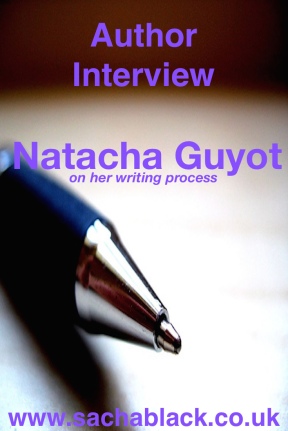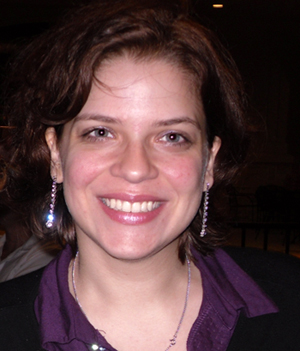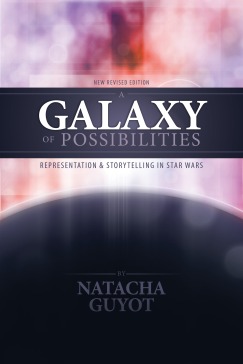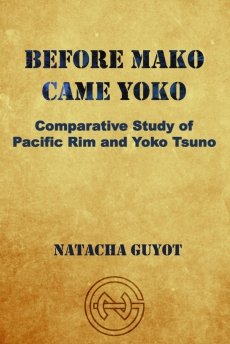 This week I welcome the lovely Natacha Guyot, you can find Natacha on Twitter, Linkedin, Goodreads: here, here, here and here, Amazon US, Science Fiction, Transmedia and Fandom. You can also see her: List of nonfiction publications, List of upcoming publications and finally her List of guest blog posts. Without further ado, please welcome Natacha
This week I welcome the lovely Natacha Guyot, you can find Natacha on Twitter, Linkedin, Goodreads: here, here, here and here, Amazon US, Science Fiction, Transmedia and Fandom. You can also see her: List of nonfiction publications, List of upcoming publications and finally her List of guest blog posts. Without further ado, please welcome Natacha
 What are you currently writing/working on?
What are you currently writing/working on?
I am halfway through writing a science fiction novella. It comes from a short story I wrote earlier this year but that had potential for a longer story. I hope to finish it by early Fall. I am also in the revising/editing stages for a nonfiction book about women in science fiction television. I plan to focus on fiction writing for the upcoming months. At this point, I have several ideas for novellas that are struggling for attention. It will be either more science fiction or more fantasy.
When and how do your characters come to you? Is it in a moment of inspiration, an epiphany? Or do they grow in some murky recess of your mind?
They come without a warning. They especially love showing up when I am in a middle of another project or am trying to fall asleep. I sometimes have characters who happen and that I don’t use before a few months or even years. Yet, I know about them and I can even watch them develop. I sometimes need to go after plot ideas with a club, but character ideas? Never. They invade my poor brain without any pity whatsoever!
There’s an acceptance that authors often write in traits or characteristics of themselves into their work, is there any part of you in any of your characters?
I have a lot of characters who steal things from me, whether a personality trait or some random quirk or taste. I don’t do this on purpose and sometimes it takes me years to recognize something in one of them. I find it interesting because characters whose personality and background who might look most alike to me aren’t necessarily the biggest thieves. I find this organic process fascinating. One of the oddest things that happened to me in the recent months was in one of my short stories. In it, a female character found a lost short haired tortie female kitten and adopted her. When I had the idea, I thought it was only due to the long haired tortie female cat I lost in 2013. Two months after I got the idea, I adopted another tortie female kitty from a shelter. I didn’t choose the little one because of her color but it just happened.
 How do you develop your characters? Do you let them brew in your subconscious, use character interview sheets, or something completely different?
How do you develop your characters? Do you let them brew in your subconscious, use character interview sheets, or something completely different?
My characters don’t give me a choice. They develop and I have to keep up. They sometimes even have arguments in my head or decide to throw a party even when they aren’t supposed to know or like one another. I don’t use character interview sheets, but take a lot of notes. I am a big note taker, whether long handed or typed. I gather enough information about them, and lately I often cast someone (actor/singer/model/personality) for them to make my visualization easier. This last habit comes from my years of roleplaying in the Star Wars universe where we choose “image claims” for our characters.
Are you a planner, or free writer?
I am a planner 95% of the time. I love outlining and creating detailed structures. It helps me a lot. The exceptions to his would be my first novella and two recent short stories. These, I have brought to life without outlining. It was a fun experience to play pantser for both short stories. I plan to write sequels to them, but this time will probably outline.
When you are developing a book, what tools or techniques do you use, e.g. timelines, mood boards, character interviews, scraps of notes?
I work with notes for the most part. I take a lot of them by hand before typing them into Word documents, outlines being the most important. I use outlines and detailed structures for both fiction and nonfiction. When I work on nonfiction projects, I also calculate my word counts per section and subsection, so I keep them relatively even. I need to find a title early as well. I always work better when I have a title! I don’t always listen to music when writing, but I have “go to” music when I do. They are mostly soundtracks (movies and video games). I have a little ritual that goes back to my first big research paper in last year of professional cinema school though. When I finish a big writing project and am writing the last bits, I listen to “Throne Room and Finale” from Star Wars Episode IV: A New Hope, by John Williams. And if possible, I listen to it loud!
Has your technique changed over time?
The biggest change in my writing is that I no longer write in my mother language. I wrote my first two fiction projects (a Science Fiction novella for kids, La Cité de Sharianth, which comes out for Kindle, on April 14, and a Dark Fantasy novel that I hope to translate to English and publish at some point) and my university research papers in French. Since 2012, I have fully moved on to English writing. My career and personal goals are to move to London in the near future and most of my contacts and friends are English speaking. English is natural to me. This change originally happened because my nonfiction works is more interesting to English speaking people. When I returned to original fiction late 2014/early 2015, I couldn’t fathom writing new projects in French. The other change is how I now write short stories and not novels for fiction writing. I hope to return to novels at some point, but I am having a blast focusing on short stories and possibly novellas for now.
Where do you draw inspiration from? Do you actively look for it?
I draw inspiration from tons of different sources. I don’t actively look for it, but I have a natural curiosity for many topics and life in general. I can have an idea because of a book I read, a show or movie I watch, a song I hear, a conversation I have, the colors in the sky, my cat redecorating my room, the enticing smell of cake. I am lucky (or cursed when the muses are on a roll) to find inspiration about every day!
 What kind of an environment do you write in?
What kind of an environment do you write in?
I write at my desk, day or night time. It depends on the mood and what I have to do on a given day. I recently got a large monitor which allows me to have two pages in Word showing up and I love it! You can find me taking notes about current or future projects anywhere though. I always have a notebook and a pencil with me, whenever I leave home.
Half way into writing my first novel, it’s taking over my brain! What advice can you give me on completing it? Or maybe an easier question. What do you wish you had known about writing a book before you started?
I would have learned to outline better before starting my first completed project. This being said, I am a plotter rather than a pantser, so this might not work for everyone. I would suggest keeping notes about your characters, story, universe… The way you organize them is very personal so there isn’t a magic wand for this. Printing what you already wrote can help as well, so you don’t need to have multiple documents opened at the same time (and navigating between tons of tabs on a small screen if you type directly can be a hassle!)
The publishing industry is in decline across the board. Do you think things like the Kindle are bridging the gap, is there still the same love for the written word, or is it being diluted by the modern obsession with tech and gadgets?
I believe people will always love the written word. Whether they read a printed copy or on a tablet/computer, they are still reading. I can’t see people giving up on reading. I have a huge love for physical copies but digital files have grown on me when it comes to certain technical nonfiction, especially writing craft, publishing and book marketing.
50 Shades of Grey author EL James was reported to make around £100k a day at the book’s height, and the upcoming film will make her millions. Do you find it a shame that the most lucrative and famous book franchise of the moment is one so widely derided for its lack of literary value? Or is it just good to have a book going mainstream?
I have no interest and even a strong dislike for 50 Shades of Grey. I didn’t like the style of the excerpts I read and am not planning to read the rest of the books or see the movies. I also have issues with some of the triggering content. I am in no place to tell people what to read though. I wish other books that I like better would make such numbers in sales, but things are what they are.
If a fascist regime was burning the worlds libraries, what books would you save?
It is hard to choose just a few. I think I’d be busy helping preserving digital libraries and turning more physical books into digital files, so more titles might survive in encrypted archives.
Which publishing route have you taken? Did you always know you were going to go down this route, and if so why?
When I started writing fiction in my teenage years, I was already intrigued by self-publishing. Back then, it was a very complicated process and I eventually gave up. My first publication was in April 2012. In 2015, I took the leap to go solely for indie publishing and I didn’t regret it at all. Indie publishing has taught me a lot about book marketing and technicalities of formatting for example. I also like keeping creative control over my titles. Fiction or nonfiction, I think that any type of publishing requires dedication and hard work, so in the end, doing what you feel is right for you at a given moment, is what matters.
What do you wish you knew about the publishing process before you started?
It would have been great to know as much as I do now, but all in all, I am all right with how things happened. If self-publishing had been as easy when I was in my late teens or early twenties, I think I would have published fiction many years ago. I might have been happy to be told that I needn’t worry about being unable to write original fiction for many years, because I would get back to it. I admit I had a few years where I felt sadness for not having the muse for such projects. In the end, everything happens for a reason!
What is the best advice you could give to aspiring novelists like me? Or what was the best advice you were ever given?
Write what you want to write, what you are passionate about. If you don’t, your writing will end sounding mechanical no matter the genre. This spark is what starts it all and you need to keep the fire alive, even on the day where your muse is snoring in the back of your mind. Work hard, be patient and persevere. I have always been encouraged to give my everything and work hard. I have doubts at times and I wish that things went better and quicker sometimes, but I remember that everything is worth the wait and I keep the faith. I would also recommend reading about writing craft, publishing, book marketing. Educating yourself is always a good thing!
 Is fanfic to be welcomed as it broadens interaction and the readers experience or a scourge that devalues the ability of an author?
Is fanfic to be welcomed as it broadens interaction and the readers experience or a scourge that devalues the ability of an author?
I am a proud fangirl and I find value in all fan creations, including fan fiction. Being able to have a playground like fan fiction, cosplay, vidding and roleplaying (to name a few examples makes for wonderful experience for fans of all ages. Even if people ever wrote fan fiction with interpretations that are against my author’s view (if one day my fiction titles gain enough readers to make for an actual fandom), I would still be happy that they like my work enough to tell more stories in one of my universes.
I am finding more and more, that writers often have several creative outlets. Do you? Or is writing your one source?
I enjoy needlepoint and baking a lot. I also have two fannish creative outlets. One is writing based too, and is my Star Wars roleplaying, which I have done since 2008. Telling my characters’ stories in a galaxy far, far away helps recharging my original writing muses a lot. I often take small breaks to make a roleplaying post on the forum where I write. I have also been creating fan videos for almost ten years. I vid many different types of movies and television series, but my YouTube channel only features Science Fiction and Fantasy related ones.
If you weren’t a writer, what would you be?
Being a writer is a core part of me, and I will always be one, but I also enjoy public speaking and would be happy with a job in the publishing industry too.
When did you know you wanted to be a writer?
I have always loved telling stories. For example, I remember adding to the Star Wars universe with my Barbie dolls when a child. I loved creating imaginary worlds from as far as I can remember to. My first “real” original story, which I saw to a complete end, was written when I was a teenager. I didn’t know back then that I would end being a fiction and nonfiction writer. The jump into nonfiction stemmed from my Master degrees and my research papers. My fascination for Science Fiction, long lasting transmedia franchises, female characters and fan studies, led me to write a lot of nonfiction/academic papers of all lengths. I enjoy the research and analytic works as much as the fiction ones.
What authors do you admire, and why?
Clarissa Pinkola Estés is my greatest nonfiction inspiration. Her book Women Who Run With the Wolves is one of my all time favorites. I often turn to her writings (and I need to read more of her books) when I work on nonfiction projects. I also love Joseph Campbell‘s writings, and am thrilled that more is still published since he died, thanks to all the notes he left behind. His work on mythologies of many kinds and how they affect creation and society have a significant place on my bookshelves. Fiction wise, I can thank Anne McCaffrey and C. J. Cherryh for giving me the inspiration to start writing my own stories. I love how they craft their universes and characters. J. K. Rowling, Joan D. Vinge, Tanith Lee, Vonda McIntyre, Martha Wells and Philippa Ballantine are also writers I admire a lot for their storytelling skills and the complex female characters they bring to life.
To find out more about Natacha read her author bio below:
Natacha Guyot is a French researcher, author and public speaker. She holds two Master’s degrees: Film and Media Studies (Paris III Sorbonne Nouvelle) and Digital Culture and Technology (King’s College London). Her main fields of interest are Science fiction, Gender Studies, Children Media and Fan Studies. She considers herself a feminist, a fangirl, a bookworm, a vidder, a gamer and a cat lover.
Reblogged this on Barrow Blogs: and commented:
Lovely interview, ladies
LikeLiked by 2 people
Thank you very much!
LikeLiked by 1 person
Aww thank you Judith, it was a lovely interview I agree. Natacha is a fab writer 😀
LikeLiked by 1 person
What a lovely interview!
LikeLiked by 2 people
Thank you! 🙂
LikeLike
Great interview! I loved the parts about Star Wars roleplaying.
LikeLiked by 2 people
Thank you! The roleplaying experience has definitely helped me grow as a writer. 🙂
LikeLiked by 1 person
That’s awesome. I find that so many of the best authors/filmmakers/actors never stop being fans.
LikeLiked by 1 person
Thanks Grace 😀
LikeLiked by 1 person
Fun interview. Nice to hear another author mention that characters sometimes run ahead and force the author to catch up.
LikeLiked by 2 people
Thank you! And yes, some characters can just storm off and you need to chase them to keep up.
LikeLike
Wonder if there’s a future in character leashes. 😀
LikeLiked by 2 people
They gnaw on it way too quickly. Or they agree to keep them on and use them to drag their poor writers along!
LikeLiked by 1 person
Good point. Pretty bad when you write with an ensemble cast. Like somebody getting yanked off a pier by a speedboat and leaving their water skis behind.
LikeLiked by 2 people
That’s what happened to me when I wrote my upcoming short story collection. I have been lucky in more recent projects to have a smaller cast with only a couple leads. At least they all ran into the same direction then!
LikeLike
My big project has about 7 main characters. The newer side one has only 2, so that seems infinitely easier to handle. 🙂
LikeLiked by 2 people
Good luck with both, but 2 should definitely be easier to handle! 🙂
LikeLiked by 1 person
you do make me giggle Charles – character lease – oh and if you happen to patent one, I’ll be your first customer!
LikeLiked by 1 person
Will do. Though I fear it will end up being turned into an author leash and doom us all.
LikeLiked by 2 people
Reblogged this on Authors to Watch and commented:
Another great interview!
LikeLiked by 2 people
Thank you! 🙂
LikeLike
ahh shucks thanks Tricia… so grateful for the support
LikeLiked by 1 person
Great interview. I used to think I was crazy when I said my characters have their own minds and tell me what to do. Now I know we are in a huge club. 🙂
LikeLiked by 3 people
Thank you! And we are very much in a huge club. If a character doesn’t have a mind of their own, they are simply keeping quiet until the right moment to reveal their (devious?) mind. 🙂
LikeLiked by 1 person
Yep – and then we better sit up and listen. 😀
LikeLiked by 2 people
Haha, not crazy, just a writer! :p I have the same problem :p
LikeLiked by 1 person
It is hard to choose just a few. I think I’d be busy helping preserving digital libraries and turning more physical books into digital files, so more titles might survive in encrypted archives.
…………my head just exploded.
LikeLiked by 2 people
That’s about what happened to me when I read the question, sweetie!
LikeLiked by 2 people
There’s a Synn arc already about saving books from crazies like this. LOL.
LikeLiked by 1 person
No digitization method…yet. :p
LikeLiked by 1 person
Reblogged this on Rose B Fischer.
LikeLiked by 2 people
Thanks Rose, really appreciate the reblog 😀
LikeLiked by 2 people
Glad to help. 🙂
LikeLiked by 2 people
Fantastic interview! I love reading your interviews Sacha. You always seem to get to the bones of a writer. 🙂
LikeLiked by 1 person
Thank you very much! Sacha’s questions were great to answer. 🙂
LikeLiked by 2 people
aww thanks Debbie – am feeling the pressure trying to come up with something new – this series will run out in November!
LikeLiked by 1 person
Before you know it, a new door will open! 🙂
LikeLiked by 1 person
Nice interview. I love the way short stories can turn into novellas.
LikeLiked by 1 person
Thank you. 🙂 and thanks for taking the time to read it.
LikeLike
What a great interview. I’m fascinated that Natacha no longer writes in her first language. Wow! To be so fluent and comfortable in two languages (at least) is wonderful. I was also interested to hear about the characters beating a path, but having to go after a plot with a club! I can see why Natacha’s genre would be of interest to you, Sacha. (No coincidence in the spelling of your names either!) Thanks for sharing your writing insights, Natacha. 🙂
LikeLiked by 1 person
Thank you very much! In the past few years, English is the language I use most commonly, though I still live in France. English is so much more comfortable for me to write. It is amusing because right now I’m plotting a vampire story with a French female lead and an Italian character as well. The one talking to me in their language is the Italian one. It is amusing, if not a little frustrating sometimes! 🙂
LikeLiked by 2 people
Wow! That is amusing. So that is at least three languages you speak. How many altogether?
LikeLiked by 2 people
I am bilingual French/English but also did 3 years of Latin, 5 of German and 3 of Italian in high school. I understand German and Italian pretty well, but my bits and pieces of speaking is more Italian. I also understand pieces of Spanish. 🙂
LikeLiked by 2 people
Impressive! 🙂
LikeLiked by 2 people
I have always wanted to learn Latin… sigh.
LikeLiked by 1 person
It’s a beautiful language. And it’s so helpful to understand bits and pieces of several languages. 🙂
LikeLiked by 1 person
I’ve put it on my 30 by 30 list. I want to achieve 30 things by the time im 30 and one of them is to learn a little latin! god knows how I am going to do it! audio book in the car maybe!
LikeLiked by 1 person
Good luck with it!
LikeLiked by 1 person
Great interview, Sacha and Natacha. I’ve always wondered about the transition to writing in English when it’s not the mother tongue. I have a hard enough time with American English and I was born into the language! 🙂
LikeLiked by 1 person
Thanks so much. and HA! you and me both, my grammar and punctuation is horrendous, I can’t edit, do corrections nothing. I will end up spending a FORTUNE on editors! god knows how Natacha does it not in her mother tongue. However she does it I am beyond impressed
LikeLiked by 1 person
It was nice learning more about you Natacha. Wonderful interview questions, Sacha.
LikeLiked by 1 person